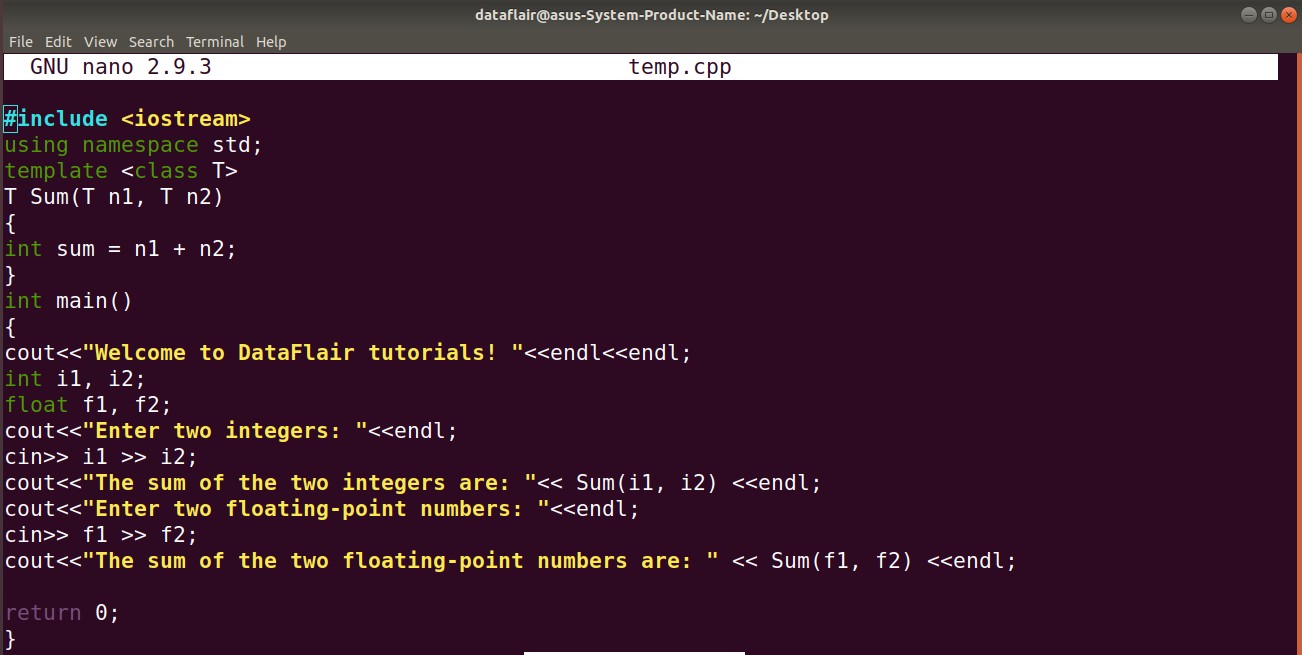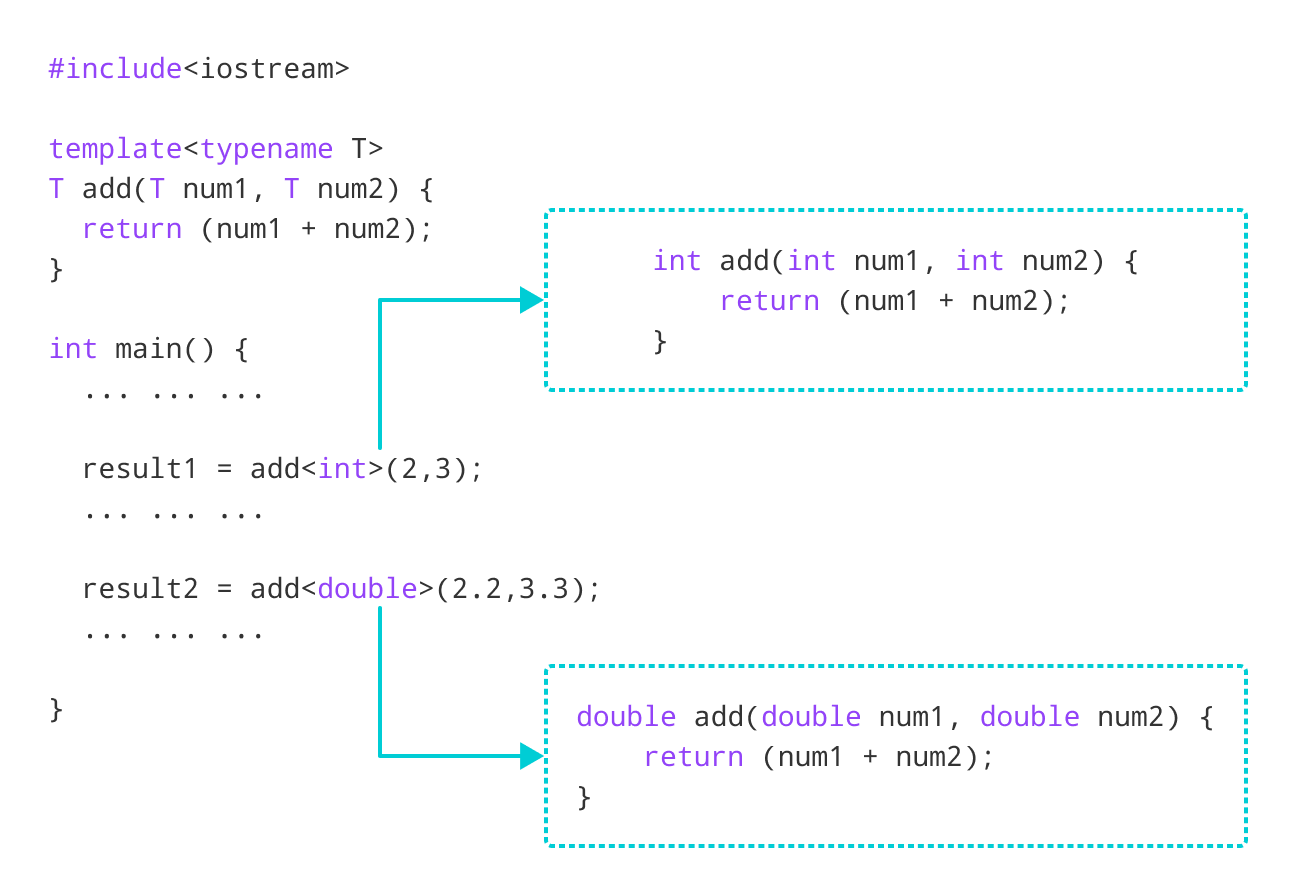Template Function In C++
Template Function In C++ - We write code once and use it for any data type including user defined data types. Template classes and functions eliminate the code duplication of different. These parameters can be generic template. I've just got confused how to implement something in a generic way in c++. Template void func (t param) {} // definition template void func (int.</p> Template in c++ is a feature. Web template function as a template argument. Web there are three kinds of templates: Since c++11, templates may be either variadic or non. Function templates are special functions that can operate with generic types. For example, sort () can be. For function templates, the arguments. It's a bit convoluted, so let me explain. Template classes and functions eliminate the code duplication of different. Web a template allows us to create a family of classes or family of functions to handle different data types. Template in c++ is a feature. Web for class templates, the arguments are either explicitly provided, deduced from the initializer, (since c++17) or defaulted. These parameters can be generic template. We write code once and use it for any data type including user defined data types. This allows us to create a function template whose functionality can be. A family of classes (class template), which may be nested classes. For function templates, the arguments. For example, sort () can be. Web there are three kinds of templates: Template void func (t param) {} // definition template void func (int.</p> Web if you really want to instantiate (instead of specialize or something) the function, do this: Web this article describes rules that are specific to c++ class templates. I've just got confused how to implement something in a generic way in c++. Web the advantage of these last two approaches is that the caller of f can provide a tuple. Web if you really want to instantiate (instead of specialize or something) the function, do this: For function templates, the arguments. For example, sort () can be. Instances of std::function can store, copy, and invoke any copyconstructible. Function templates, class templates and, since c++14, variable templates. For example, sort () can be. Function templates, class templates and, since c++14, variable templates. Web template function as a template argument. This allows us to create a function template whose functionality can be. Web whether an explicit specialization of a function or variable (since c++14) template is inline /constexpr (since c++11) /constinit/consteval (since c++20) is. Function templates are special functions that can operate with generic types. We write code once and use it for any data type including user defined data types. Instances of std::function can store, copy, and invoke any copyconstructible. This allows us to create a function template whose functionality can be. It's a bit convoluted, so let me explain. I've just got confused how to implement something in a generic way in c++. Web whether an explicit specialization of a function or variable (since c++14) template is inline /constexpr (since c++11) /constinit/consteval (since c++20) is. Web this article describes rules that are specific to c++ class templates. Member functions can be defined inside or outside of a. Web a. We write code once and use it for any data type including user defined data types. This allows us to create a function template whose functionality can be. Web this article describes rules that are specific to c++ class templates. Web there are three kinds of templates: Web the advantage of these last two approaches is that the caller of. I've just got confused how to implement something in a generic way in c++. Web a template allows us to create a family of classes or family of functions to handle different data types. It's a bit convoluted, so let me explain. Web a template is a c++ entity that defines one of the following: Template void func (t param). These parameters can be generic template. Web the process of creating functions (with specific types) from function templates (with template types) is called function template instantiation (or. Since c++11, templates may be either variadic or non. For function templates, the arguments. For example, sort () can be. Web this article describes rules that are specific to c++ class templates. Web there are three kinds of templates: Member functions of class templates. Web a template allows us to create a family of classes or family of functions to handle different data types. Web for class templates, the arguments are either explicitly provided, deduced from the initializer, (since c++17) or defaulted. Template in c++ is a feature. Template void func (t param) {} // definition template void func (int.</p> This allows us to create a function template whose functionality can be. A family of classes (class template), which may be nested classes. I've just got confused how to implement something in a generic way in c++. Instances of std::function can store, copy, and invoke any copyconstructible. Web a template is a c++ entity that defines one of the following: It's a bit convoluted, so let me explain. We write code once and use it for any data type including user defined data types. Function templates, class templates and, since c++14, variable templates. Member functions can be defined inside or outside of a. Web a template allows us to create a family of classes or family of functions to handle different data types. Web whether an explicit specialization of a function or variable (since c++14) template is inline /constexpr (since c++11) /constinit/consteval (since c++20) is. A family of classes (class template), which may be nested classes. For example, sort () can be. Since c++11, templates may be either variadic or non. Function templates are special functions that can operate with generic types. I've just got confused how to implement something in a generic way in c++. These parameters can be generic template. Template void func (t param) {} // definition template void func (int.</p> Instances of std::function can store, copy, and invoke any copyconstructible. Web for class templates, the arguments are either explicitly provided, deduced from the initializer, (since c++17) or defaulted. It's a bit convoluted, so let me explain. Web a template is a c++ entity that defines one of the following: Web if you really want to instantiate (instead of specialize or something) the function, do this: Web the process of creating functions (with specific types) from function templates (with template types) is called function template instantiation (or.C++ Redefinition Of Template Function
C++ Template A Simple and Excellent Concept to Master DataFlair
C++ Redefinition Of Template Function
Templates in C++ Simple Snippets
C++ Redefinition Of Template Function
C++ Redefinition Of Template Function
C++ Templates Function Template YouTube
C++ Template RAVISHING TEMPLATES
C++ Function Templates YouTube
C++ Template Function In Class? Trust The Answer
Member Functions Of Class Templates.
Template Classes And Functions Eliminate The Code Duplication Of Different.
Function Templates, Class Templates And, Since C++14, Variable Templates.
This Allows Us To Create A Function Template Whose Functionality Can Be.
Related Post:









